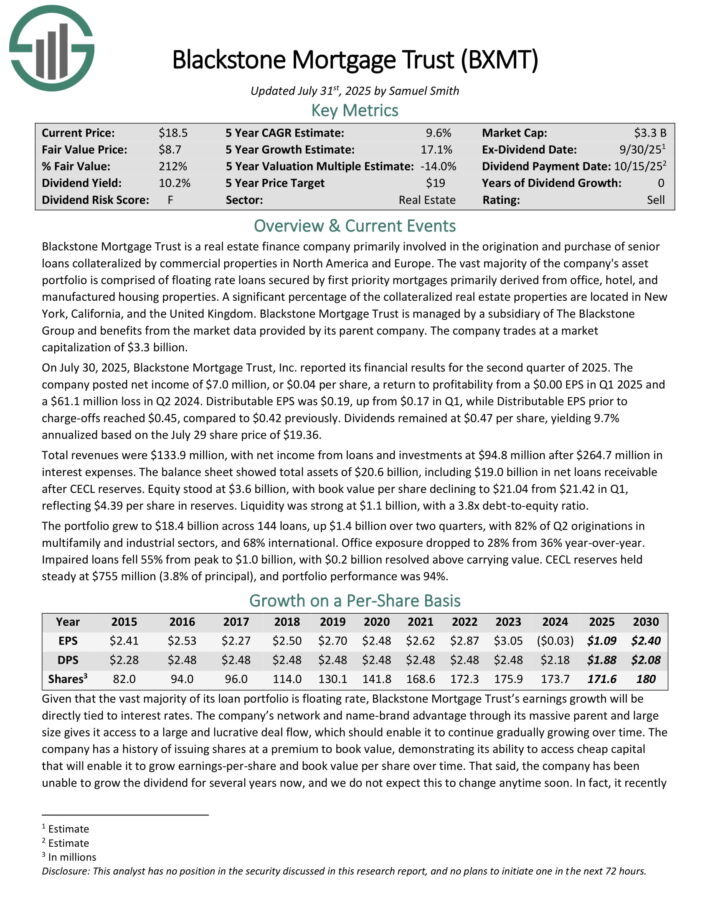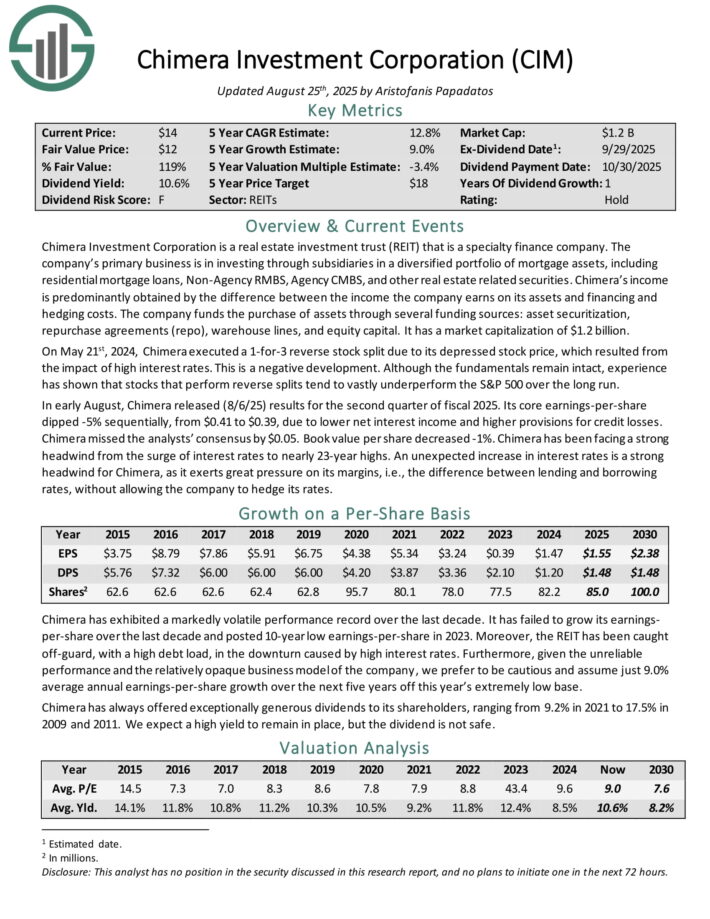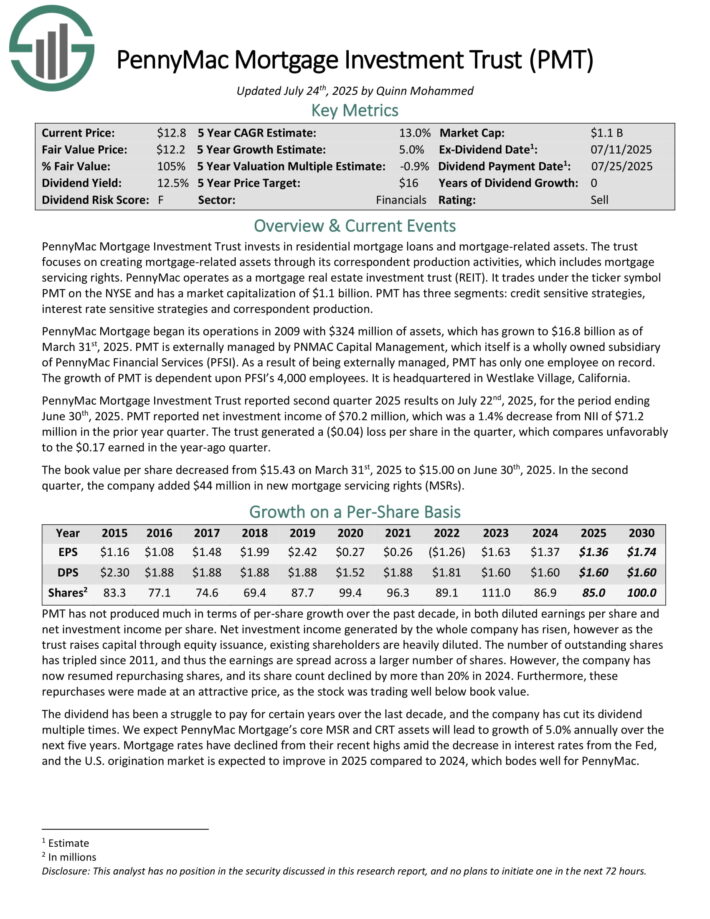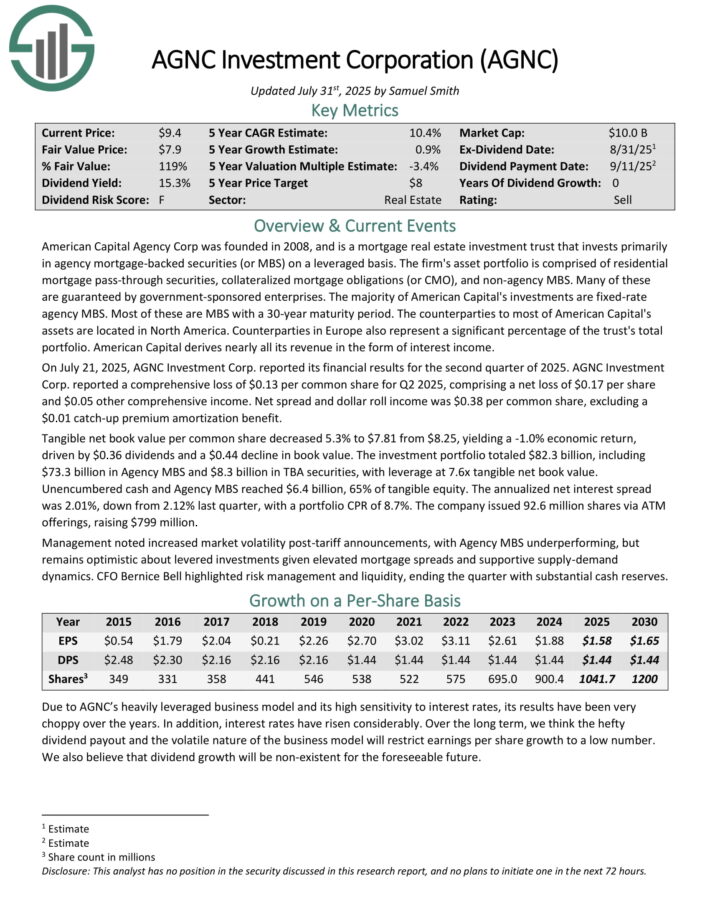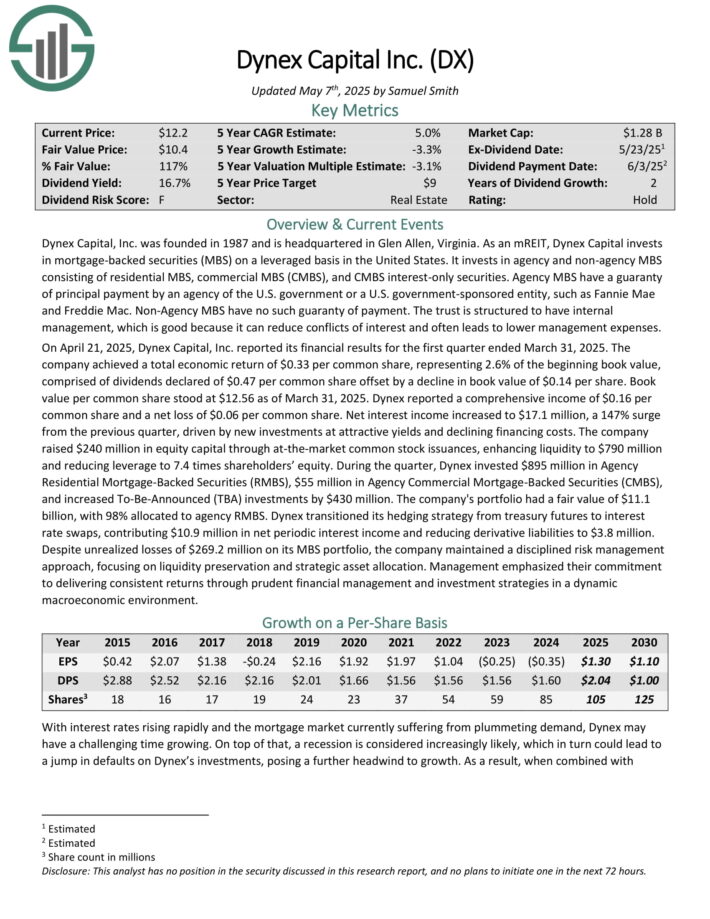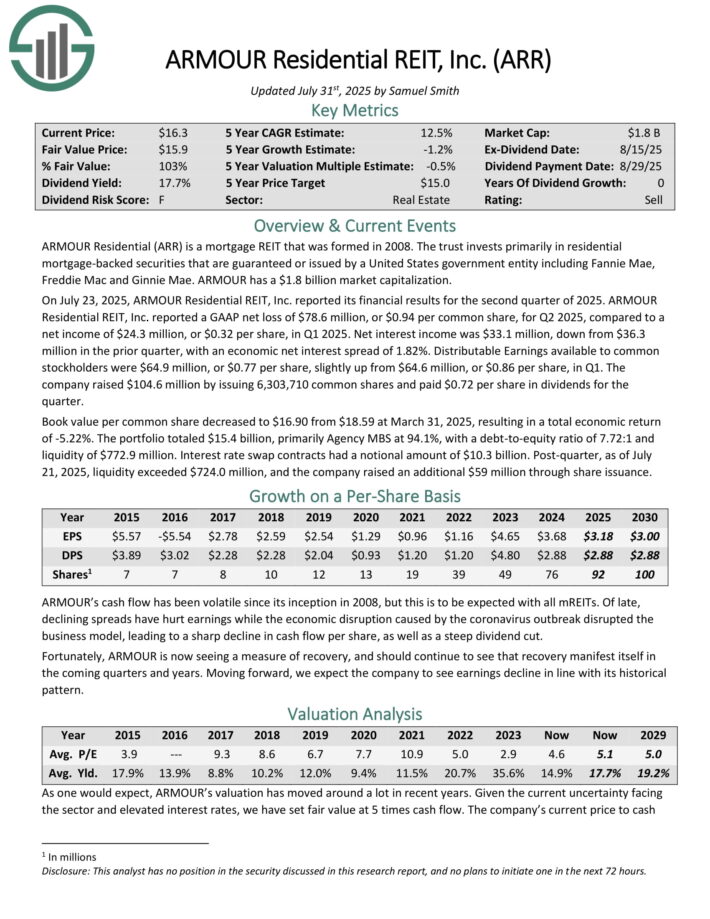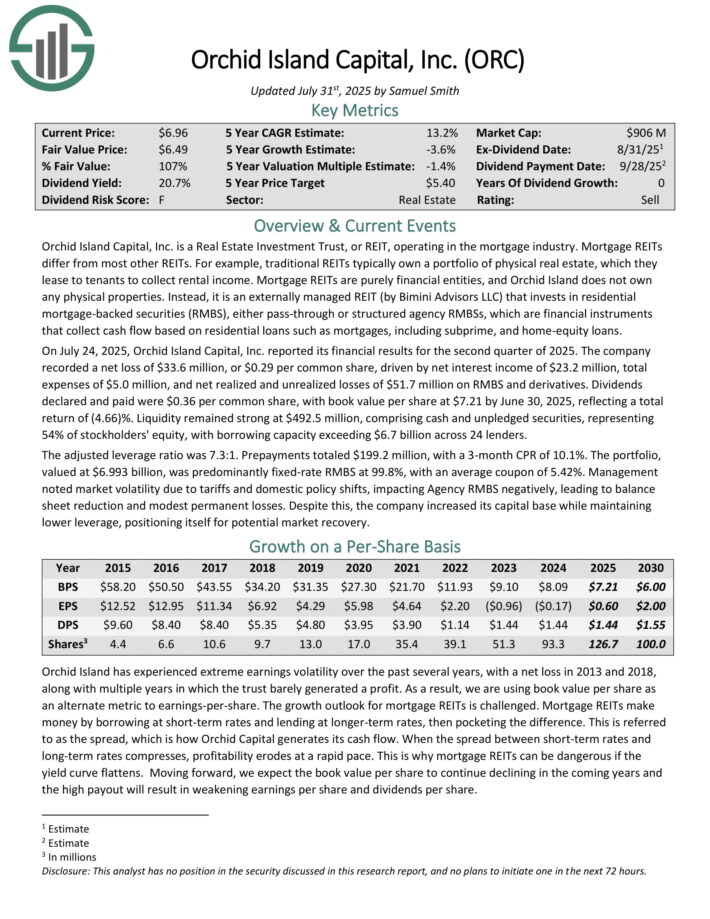Updated on August 28th, 2025 by Bob Ciura
Mortgage Real Estate Investment Trusts (i.e., “REITs”) – often referred to as “mREITs” – can provide a very attractive source of income for investors.
This is because they invest in mortgages that are typically backed by hard assets (commercial and/or residential real estate) with fairly conservative loan-to-value ratios.
Mortgage REITs finance these portfolios with a mixture of equity (that they raise by selling shares to investors) and debt that they generally raise at an interest cost that is meaningfully lower than the interest rates they can command on their real estate mortgage investments.
The result is significant and stable cash flow for the mREIT.
You can download your free 200+ REIT list (along with important financial metrics like dividend yields and payout ratios) by clicking on the link below:
Moreover, as REITs they are exempt from having to pay corporate taxes on their net interest income and are required to pay out at least 90% of their taxable income to shareholders via dividends.
This generally means that mREIT shareholders earn very high dividend yields, making mREIT shares an exceptional source of passive income.
Of course, due to their significant amount of leverage, mortgage REITs come with risks that occasionally lead to dividend cuts.
As a result, investors need to be prudent when selecting which mREITs to invest in.
This article will list the 8 highest yielding mortgage REITs in the Sure Analysis Research Database.
Table of Contents
You can instantly jump to any specific section of the article by using the links below:
#8: Blackstone Mortgage Trust (BXMT)
Blackstone Mortgage Trust is a real estate finance company primarily involved in the origination and purchase of senior loans collateralized by commercial properties in North America and Europe.
The vast majority of the company’s asset portfolio is comprised of floating rate loans secured by first priority mortgages primarily derived from office, hotel, and manufactured housing properties.
On July 30, 2025, Blackstone Mortgage Trust, Inc. reported its financial results for the second quarter of 2025. The company posted net income of $7.0 million, or $0.04 per share, a return to profitability from a $0.00 EPS in Q1 2025 and a $61.1 million loss in Q2 2024.
Distributable EPS was $0.19, up from $0.17 in Q1, while Distributable EPS prior to charge-offs reached $0.45, compared to $0.42 previously. Dividends remained at $0.47 per share, yielding 9.7% annualized based on the July 29 share price of $19.36.
Total revenues were $133.9 million, with net income from loans and investments at $94.8 million after $264.7 million in interest expenses. The balance sheet showed total assets of $20.6 billion, including $19.0 billion in net loans receivable after CECL reserves.
Equity stood at $3.6 billion, with book value per share declining to $21.04 from $21.42 in Q1, reflecting $4.39 per share in reserves. Liquidity was strong at $1.1 billion, with a 3.8x debt-to-equity ratio.
The portfolio grew to $18.4 billion across 144 loans, up $1.4 billion over two quarters, with 82% of Q2 originations in multifamily and industrial sectors, and 68% international. Office exposure dropped to 28% from 36% year-over-year.
Impaired loans fell 55% from peak to $1.0 billion, with $0.2 billion resolved above carrying value. CECL reserves held steady at $755 million (3.8% of principal), and portfolio performance was 94%.
Click here to download our most recent Sure Analysis report on BXMT (preview of page 1 of 3 shown below):
#7: Chimera Investment Corp. (CIM)
Chimera Investment Corporation is a real estate investment trust (REIT) that is a specialty finance company. The company’s primary business is in investing through subsidiaries in a diversified portfolio of mortgage assets, including residential mortgage loans, Non-Agency RMBS, Agency CMBS, and other real estate related securities.
Chimera’s income is predominantly obtained by the difference between the income the company earns on its assets and financing and hedging costs.
The company funds the purchase of assets through several funding sources: asset securitization, repurchase agreements (repo), warehouse lines, and equity capital.
In early August, Chimera released (8/6/25) results for the second quarter of fiscal 2025. Its core earnings-per-share dipped -5% sequentially, from $0.41 to $0.39, due to lower net interest income and higher provisions for credit losses.
Chimera missed the analysts’ consensus by $0.05. Book value per share decreased -1%.
Chimera has been facing a strong headwind from the surge of interest rates to nearly 23-year highs. An unexpected increase in interest rates is a strong headwind for Chimera, as it exerts great pressure on its margins, i.e., the difference between lending and borrowing rates, without allowing the company to hedge its rates.
Click here to download our most recent Sure Analysis report on CIM (preview of page 1 of 3 shown below):
#6: PennyMac Mortgage Investment Trust (PMT)
PennyMac Mortgage Investment Trust invests in residential mortgage loans and mortgage-related assets. The trust focuses on creating mortgage-related assets through its correspondent production activities, which includes mortgage servicing rights. PennyMac operates as a mortgage real estate investment trust (REIT).
PMT has three segments: credit sensitive strategies, interest rate sensitive strategies and correspondent production. PennyMac Mortgage began its operations in 2009 with $324 million of assets, which has grown to $14.9 billion as of March 31st, 2025.
PMT is externally managed by PNMAC Capital Management, which itself is a wholly owned subsidiary of PennyMac Financial Services (PFSI). As a result of being externally managed, PMT has only one employee on record.
PennyMac Mortgage Investment Trust reported second quarter 2025 results on July 22nd, 2025, for the period ending June 30th, 2025. PMT reported net investment income of $70.2 million, which was a 1.4% decrease from NII of $71.2 million in the prior year quarter.
The trust generated a ($0.04) loss per share in the quarter, which compares unfavorably to the $0.17 earned in the year-ago quarter. The book value per share decreased from $15.43 on March 31st, 2025 to $15.00 on June 30th, 2025.
Click here to download our most recent Sure Analysis report on PMT (preview of page 1 of 3 shown below):
#5: AGNC Investment Corporation (AGNC)
American Capital Agency Corp is a mortgage real estate investment trust that invests primarily in agency mortgage–backed securities (or MBS) on a leveraged basis.
The firm’s asset portfolio is comprised of residential mortgage pass–through securities, collateralized mortgage obligations (or CMO), and non–agency MBS. Many of these are guaranteed by government–sponsored enterprises.
On July 21, 2025, AGNC Investment Corp. reported its financial results for the second quarter of 2025. AGNC Investment Corp. reported a comprehensive loss of $0.13 per common share for Q2 2025, comprising a net loss of $0.17 per share and $0.05 other comprehensive income.
Net spread and dollar roll income was $0.38 per common share, excluding a $0.01 catch-up premium amortization benefit.
Tangible net book value per common share decreased 5.3% to $7.81 from $8.25, yielding a -1.0% economic return, driven by $0.36 dividends and a $0.44 decline in book value. The investment portfolio totaled $82.3 billion, including $73.3 billion in Agency MBS and $8.3 billion in TBA securities, with leverage at 7.6x tangible net book value.
Unencumbered cash and Agency MBS reached $6.4 billion, 65% of tangible equity. The annualized net interest spread was 2.01%, down from 2.12% last quarter, with a portfolio CPR of 8.7%. The company issued 92.6 million shares via ATM offerings, raising $799 million.
Click here to download our most recent Sure Analysis report on AGNC Investment Corp (AGNC) (preview of page 1 of 3 shown below):
#4: Dynex Capital (DX)
Dynex Capital invests in mortgage–backed securities (MBS) on a leveraged basis in the United States. It invests in agency and non–agency MBS consisting of residential MBS, commercial MBS (CMBS), and CMBS interest–only securities.
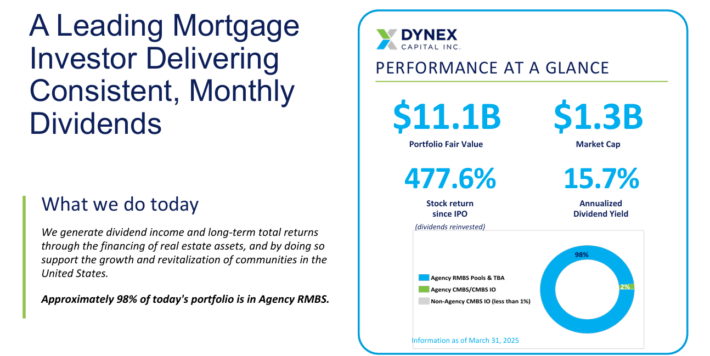

Source: Investor Presentation
On April 21, 2025, Dynex Capital, Inc. reported its financial results for the first quarter ended March 31, 2025. The company achieved a total economic return of $0.33 per common share, representing 2.6% of the beginning book value, comprised of dividends declared of $0.47 per common share offset by a decline in book value of $0.14 per share. Book value per common share stood at $12.56 as of March 31, 2025.
Dynex reported a comprehensive income of $0.16 per common share and a net loss of $0.06 per common share. Net interest income increased to $17.1 million, a 147% surge from the previous quarter, driven by new investments at attractive yields and declining financing costs.
Click here to download our most recent Sure Analysis report on DX (preview of page 1 of 3 shown below):
#3: Ellington Credit Co. (EARN)
Ellington Credit Co. acquires, invests in, and manages residential mortgage and real estate related assets. Ellington focuses primarily on residential mortgage-backed securities, specifically those backed by a U.S. Government agency or U.S. government–sponsored enterprise.
Agency MBS are created and backed by government agencies or enterprises, while non-agency MBS are not guaranteed by the government.
On May 20th, 2025, Ellington Credit reported its first quarter results for the period ending March 31, 2025. The company generated net loss of $(7.9) million, or $(0.23) per share.
Ellington achieved adjusted distributable earnings of $9.0 million in the quarter, leading to adjusted earnings of $0.26 per share, which covered the dividend paid in the period.
Ellington’s net interest margin was 5.27% overall. At quarter end, Ellington had $17.4 million in cash and cash equivalents, and $152 million of other unencumbered assets.
The debt-to-equity ratio was 2.2X. Book value per share saw a reduction from the previous quarter to $6.08, a 7% sequential decrease.
Click here to download our most recent Sure Analysis report on EARN (preview of page 1 of 3 shown below):
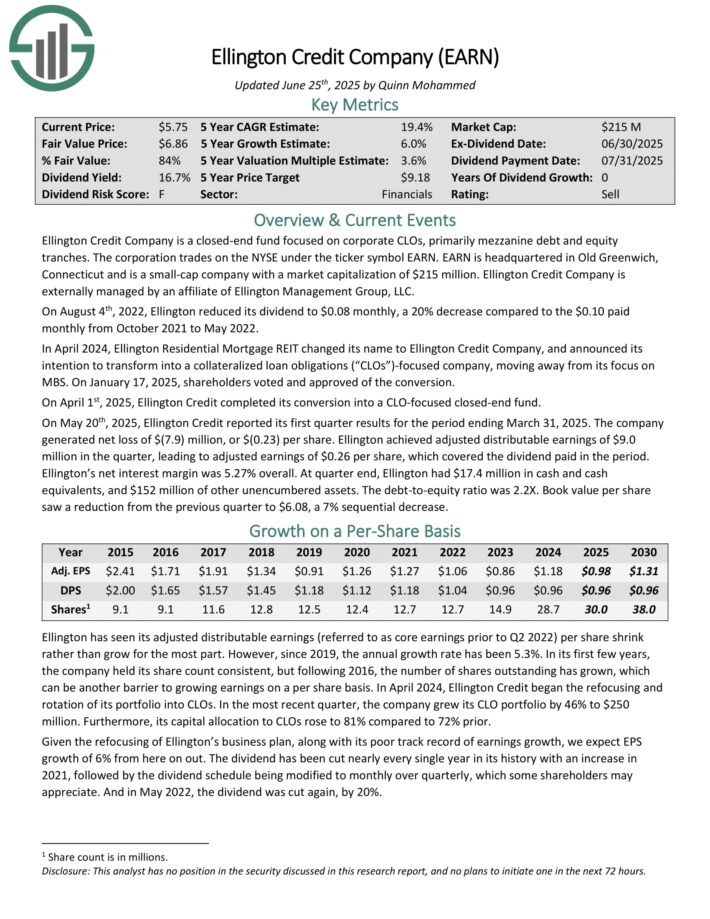

#2: ARMOUR Residential REIT (ARR)
ARMOUR Residential invests in residential mortgage-backed securities that include U.S. Government-sponsored entities (GSE) such as Fannie Mae and Freddie Mac.
It also includes Ginnie Mae, the Government National Mortgage Administration’s issued or guaranteed securities backed by fixed-rate, hybrid adjustable-rate, and adjustable-rate home loans.
Unsecured notes and bonds issued by the GSE and the US Treasury, money market instruments, and non-GSE or government agency-backed securities are examples of other types of investments.
On July 23, 2025, ARMOUR Residential REIT, Inc. reported its financial results for the second quarter of 2025. ARMOUR Residential REIT, Inc. reported a GAAP net loss of $78.6 million, or $0.94 per common share, for Q2 2025, compared to a net income of $24.3 million, or $0.32 per share, in Q1 2025.
Net interest income was $33.1 million, down from $36.3 million in the prior quarter, with an economic net interest spread of 1.82%. Distributable Earnings available to common stockholders were $64.9 million, or $0.77 per share, slightly up from $64.6 million, or $0.86 per share, in Q1.
The company raised $104.6 million by issuing 6,303,710 common shares and paid $0.72 per share in dividends for the quarter. Book value per common share decreased to $16.90 from $18.59 at March 31, 2025, resulting in a total economic return of -5.22%.
The portfolio totaled $15.4 billion, primarily Agency MBS at 94.1%, with a debt-to-equity ratio of 7.72:1 and liquidity of $772.9 million.
Click here to download our most recent Sure Analysis report on ARMOUR Residential REIT Inc (ARR) (preview of page 1 of 3 shown below):
#1: Orchid Island Capital, Inc. (ORC)
Orchid Island Capital, Inc. is an mREIT that is externally managed by Bimini Advisors LLC and focuses on investing in residential mortgage-backed securities (RMBS), including pass-through and structured agency RMBSs.
These financial instruments generate cash flow based on residential loans such as mortgages, subprime, and home-equity loans.
On July 24, 2025, Orchid Island Capital, Inc. reported its financial results for the second quarter of 2025. The company recorded a net loss of $33.6 million, or $0.29 per common share, driven by net interest income of $23.2 million, total expenses of $5.0 million, and net realized and unrealized losses of $51.7 million on RMBS and derivatives.
Dividends declared and paid were $0.36 per common share, with book value per share at $7.21 by June 30, 2025, reflecting a total return of (4.66)%.
Liquidity remained strong at $492.5 million, comprising cash and unpledged securities, representing 54% of stockholders’ equity, with borrowing capacity exceeding $6.7 billion across 24 lenders.
Click here to download our most recent Sure Analysis report on Orchid Island Capital, Inc. (ORC) (preview of page 1 of 3 shown below):
Conclusion
As you can see from the dividend yields offered by the ten stocks discussed in this article, mREITs can be powerful passive income generators.
However, investors need to be careful before investing in this sector, given that dividend cuts can be common during periods of economic stress. As a result, diversification and a focus on quality are essential.
Additional Reading
You can see more high-quality dividend stocks in the following Sure Dividend databases, each based on long streaks of steadily rising dividend payments:
Alternatively, another great place to look for high-quality business is inside the portfolios of highly successful investors.
By analyzing the portfolios of legendary investors running multi-billion dollar investment portfolios, we are able to indirectly benefit from their million-dollar research budgets and personal investing expertise.
To that end, Sure Dividend has created the following two articles:
You might also be looking to create a highly customized dividend income stream to pay for life’s expenses.
The following lists provide useful information on high dividend stocks and stocks that pay monthly dividends:
Thanks for reading this article. Please send any feedback, corrections, or questions to support@suredividend.com.



